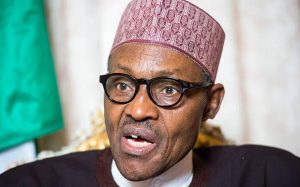Some delegates of the 2014 National Conference, groups and human rights activists on Friday countered President Muhammadu Buhari’s stance on calls for the independence of Biafra and other secession agitations. They asked him to allow a referendum that would give agitators the chance to decide their fate on the matter.
There have been agitations by the Indigenous People of Biafra and some other groups to secede from Nigeria but the President has repeatedly described Nigeria’s unity as non-negotiable.
Also on Thursday, during a meeting with the South-East Council of Traditional Rulers at the Presidential Villa, the President reiterated his stance that Nigeria should remain united.
However, a delegate to the 2014 Confab and National Publicity Secretary of Afenifere, a pan-Yoruba group, Yinka Odumakin, berated the President’s stance on the issue, saying “there is basically nothing that is non-negotiable about Nigeria.”
Odumakin said, “At this stage, there must be a referendum in the South-East in line with the United Nations’ instrument on self-determination to determine if the people want a separate country or if they want to stay within Nigeria and on what terms. It is only a poor student of history that cannot see where all this will end if we fail to deal with it in a civilised manner.
“Soviet Union, with all its might, broke up in days without a gunshot being fired. Various countries sprouted from its ruins and are now fulfilling their manifest destiny. You cannot keep people in a forced marriage in this age of self-determination.”
Likewise, another 2014 Confab delegate, Prof. A.B.C. Nwosu, who said Nigeria was practising “fake federalism”, also called for a “referendum throughout Nigeria for us to decide on the decisions we took at the 2014 National Conference.”
“If there is a thorny issue that is likely to pull at the basic fabric of the nation and we want to determine it with a referendum, it is alright with me, that is democracy. I have nothing against referendum. And nobody is good enough to preside over a people without their consent,” Nwosu said.
In his view, one of the delegates at the last Confab, Dr. Junaid Mohammed, who called on Nigerians to learn to build the nation and not marginalise any region in the process, however, added that “in modern political life, everything is negotiable.”
Mohammed, who is also the Convener of the Coalition of Northern Politicians, Academics, Professionals and Businessmen, added, “So, I don’t believe in Buhari telling us that anything is not negotiable. You do not make a nation by enforcing your world view on the nation. There are over 186 million Nigerians today and it is a very bold or reckless man who will imagine that Nigerians can agree on a single concept of nationhood.”
According to the Publicity Secretary, Osun State Civil Society Coalition, Mr. Ismaeel Uthman, negotiating the unity of Nigeria will bring the needed peace in the country.
Uthman said, “Constitutionally, Nigeria’s unity is not negotiable. But by convention, Nigeria’s unity can be negotiated to create room for understandable cohabitation and peaceful coexistence to strengthen the country’s unity.
“Referendum is a globally recognised mechanism for secession, but our constitution does not support secession. But if a zone or region in Nigeria feels cheated or is not comfortable with the treatment it is receiving from the Federal Government, it is morally right to get the government and the international community to listen to it through a referendum.”
The National Secretary of Anioma Youth Forum, Mr. Bath Ozah, who spoke with one of our correspondents in Asaba, Delta State, said, “If the President wants the youth to stop the agitation for Biafra, he should treat all religions, social groups and states equally. But if he continues with his old method, there is no reason the unity of this country called Nigeria is not negotiable.”
The spokesman for the Edo State Civil Society Organisations, Osazee Edigin, said, “A referendum should be carried out as it has been done in Sudan and other countries of the world.”
A human rights activist based in Minna, Niger State, Chijoke Ike, said, “You cannot force a person or group of persons to belong where they don’t want to belong; they have the right of choice, according to the UN charter.”
According to Mohammed Dalami, another activist, the constitution of Nigeria gives every citizen the right to associate.
“The fight for sovereignty is through referendum. Referendum is the only tool in a civilised society to get sovereignty.
“Just recently, Britain pulled out of the European Union after a referendum. The same thing happened in South Sudan, so Nigeria cannot be an exception,” he said.
Also, human rights activists, Dagana Haske and Mr. Inibehe Effiong, said they did not believe in Nigeria breaking up, but faulted the approach being used by the President to deal with agitators.
“The Federal Government lacks the requisite constitutional enablement to convoke a referendum. The 1999 Constitution does not provide for a framework for holding a referendum. It will take a constitutional amendment for such a referendum to hold. But there is nothing wrong in holding a referendum,” Effiong said.
The Chairman, Ohaneze Ndigbo in Delta Central and South area of Delta State, Mr. Jude Chiedozie, said dissolution was not the answer to the many challenges confronting Nigeria as a country.
The Igbo leader, however, said “referendum is not a bad idea if our leaders are sincere. There is nothing wrong if we decide to discuss as a people.”
A member of the Ohana-Eze Ndigbo in Adamawa State, Chief Ofor Nwachukwu, who is the immediate past President of the Igbo Cultural Association in Adamawa, said the clamour for secession by some “people will continue until the Nigerian state is willing to be more accommodating.”
Source: punch
